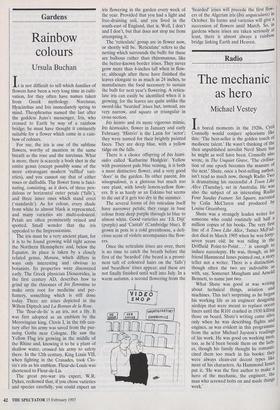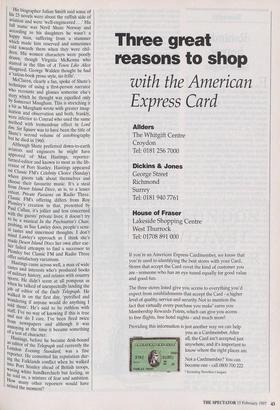Radio
The mechanic as hero
Michael Vestey
In bored moments in the 1920s, Cyril Connolly would conjure aphorisms like this: 'The best-seller is the golden touch of mediocre talent.' He wasn't thinking of the then unpublished novelist Nevil Shute but he might as well have been. Connolly also wrote, in The Unquiet Grave, 'The civilisa- tion of one epoch becomes the manure of the next.' Shute, once a best-selling author, isn't read so much now, though Radio Two is dramatising his successful A Town Like Alice (Tuesday), set in Australia. He was also the subject of an interesting Radio Four Sunday Feature: Set Square, narrated by Colin McClaren and produced by Louise Greenberg. Shute was a strangely leaden writer for someone who could routinely sell half a million copies of his books. The very first line of A Town Like Alice, 'James McFad- den died in March 1905 when he was forty- seven years old; he was riding in the Driffield Point-to-Point ...' is enough to induce narcolepsy. He was, though, as his friend Hammond Innes pointed out, a story teller not a writer. There is a distinction, though often the two are indivisible as with, say, Somerset Maugham and Arnold Bennett, to name just two. What Shute was good at was writing about technical things, aviation and machines. This isn't surprising as he began his working life as an engineer designing airships that were meant to replace ocean liners until the R101 crashed in 1930 killing those on board. Shute's writing came alive only when he was describing flights and engines, as was evident in this programme from the actor Michael Jayston's readings of his work. He was good on working men, too, as he'd been beside them on the lath- es, though his family thought he romanti- cised them too much in his books; they were always clean-cut decent types like most of his characters. As Hammond Innes put it, 'He was the first author to make a hero of the mechanic, the engineer, the man who screwed bolts on and made things work.' His biographer Julian Smith said some of his 23 novels were about the raffish side of aviation and were 'well-engineered . ..' His full name was Nevil Shute Norway and according to his daughters he wasn't a happy man, suffering from a stammer which made him reserved and sometimes cold towards them when they were chil- dren. His women characters were poorly drawn, though Virginia McKenna who starred in the film of A Town Like Alice disagreed. George Walden thought he had a 'ration-book prose style, no frills'. McClaren, clearly a fan, spoke of Shute's technique of using a first-person narrator who recounts and glosses someone else's story which he thought was equalled only by Somerset Maugham. This is stretching it a bit as Maugham wrote with greater imag- ination and observation and both, frankly, were inferior to Conrad who used the same method with tremendous effect in Lord Jim. Set Square was to have been the title of Shute's second volume of autobiography but he died in 1960. Al though Shute preferred down-to-earth aviators and engineers he might have approved of Max Hastings, reporter- turned-editor and known to most as the lib- erator of Port Stanley. Hastings appeared on Classic FM's Celebrity Choice (Sunday) where guests talk about themselves and choose their favourite music. It's a steal from Desert Island Discs, as is, to a lesser extent, Private Passions on Radio Three. Classic FM's offering differs from Roy Plomley's creation in that, presented by Paul Callan, it's jollier and less concerned with the guests' private lives; it doesn't try to be a musical In the Psychiatrist's Chair, probing, as Sue Lawley does, people's sexu- al tastes and innermost thoughts. I don't mind Lawley's approach as I think she's made Desert Island Discs her own after ear- lier failed attempts to find a successor to Plomley but Classic FM and Radio Three offer satisfactory variations. Hastings came across well, a man of wide tastes and interests who's produced books of military history, and relaxes with country sports. He didn't seem at all pompous as When he talked of unexpectedly landing the job of editor of the Daily Telegraph. He walked in on the first day, 'petrified and wondering if anyone would do anything I told them'. He's said to be ruthless with staff. I've no way of knowing if this is true and nor do I care. I've been fired twice from newspapers and although it was annoying at the time it became something or a test of character. . Hastings, before he became desk-bound as editor of the Telegraph and currently the London Evening Standard, was a fine reporter. He cemented his reputation dur- ing the Falklands conflict when he walked into Port Stanley ahead of British troops, waving white handkerchiefs but feeling, as he told us, a mixture of fear and ambition. How many other reporters would have seized the moment?



























































 Previous page
Previous page